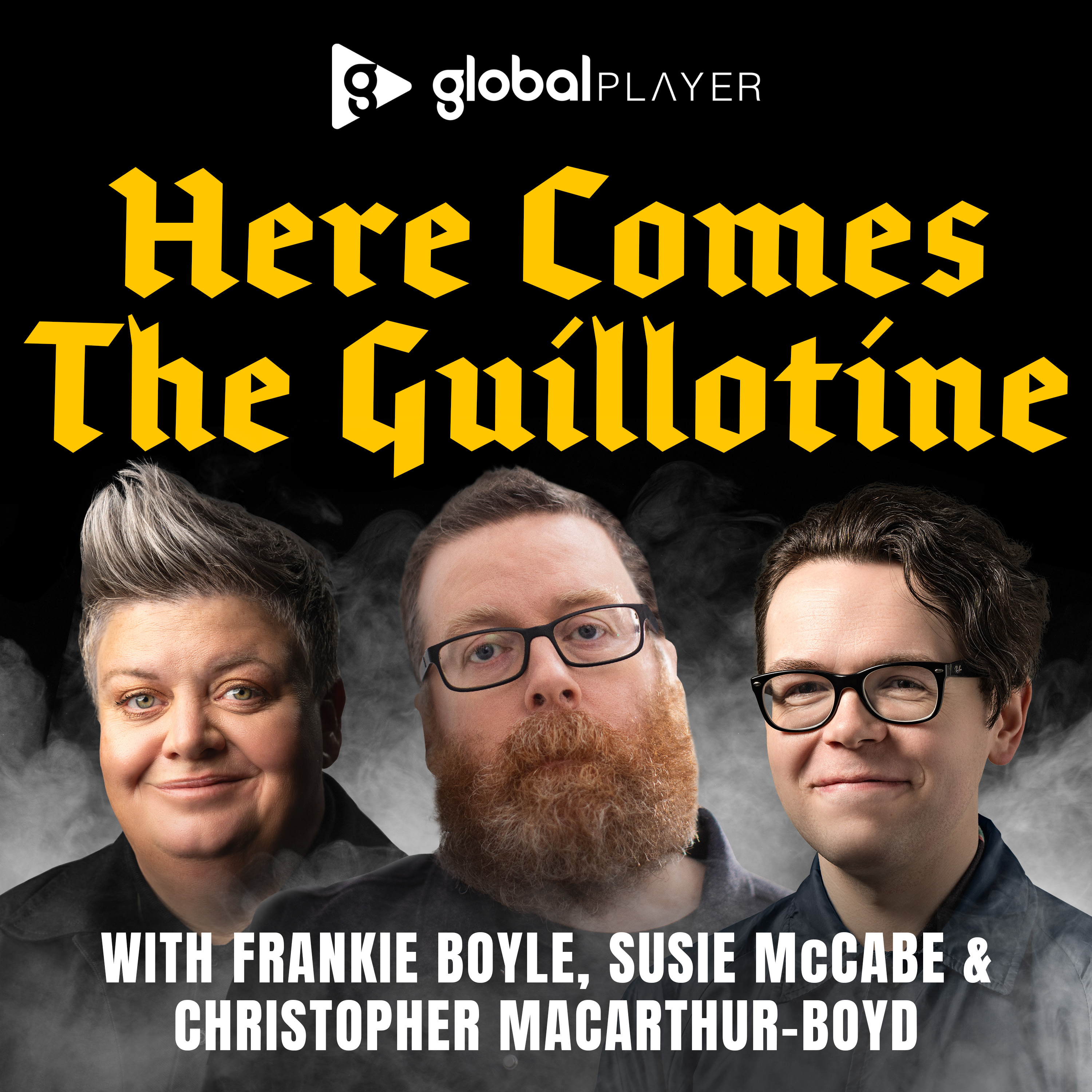Charles Dickens: A Brain on Fire! 🔥
Guests include: Stephen Fry, Miriam Margolyes, Armando Iannucci, Alice Loxton, Robert Douglas-Fairhurst, Lucinda Hawksley, John Mullan, Pen Vogler, Andrew Davies, Rosie Holt, Bernard Cornwell .... and many more academics, writers, actors, directors and descendants of the great man himself!
Along side these interviews there are special Dickens readings from across his works ...
Thank you for listening 🔥
Charles Dickens: A Brain on Fire! 🔥
The Gunpowder Plot (from 'A Child's History of England') 📚 : Read by Dominic Gerrard
Host Dominic Gerrard reads Dickens' account of The Gunpowder Plot from his 1851 A Child's History of England ...
Dickens transports back us to 1605, the era of King James I, Guy Fawkes and a conspiracy that shook the nation.
This compelling narrative is a tribute to November 5th, a date that continues to resonate through the annals of history.
If you'd like to make a donation to support the costs of producing this series you can buy 'coffees' right here https://www.buymeacoffee.com/dominicgerrard
Thank you so much!
Host: Dominic Gerrard
Series Artwork: Léna Gibert
Original Music: Dominic Gerrard
Thank you for listening!
Remember, remember the fifth of November. Gunpowder, treason and plot. I see no reason why gunpowder treason should ever be forgot. Guy Fawkes, guy Fawkes, it was his intent to blow up the king and parliament Three score barrels of powder below poor old England to overthrow. By God's providence, he was catched with a dark lantern and burning match. Holler boys, holler boys, let the bells ring. Holler boys, holler boys, god save the king. Hi everyone, the fifth of November carries a special significance to the world at the moment because, as you know, in 2024 the United States of America will choose its next president. The world is holding its breath.
Speaker 1:In Britain, this date had echoed down the centuries because it was on this day in 1605, a group of what you might term Catholic extremists attempted to blow up England's ancient parliament building during the state opening, murdering in one fell swoop the king, his son and the foremost law makers of the realm. The conspirators were to then ride out across the country, stirring up a Catholic revolt against England's Protestant rulers. Every year since then, bonfires, effigies and fireworks have lit up the skies at night to mark the moment when the future of England was saved from oblivion. The key figure remembered more than King James is Guy Fawkes, whose faces replicated hundreds of times in masked protests and online in our world today. If you've seen the film Viva Vendetta, you know exactly the face I mean. So this year I thought I'd read from Dickens' chapter on James I in his Child's History of England. James was Scottish Protestant, despite a Catholic wife and mother, and Dickens, at the start of the chapter, wastes no time in running him down, describing him as ugly, awkward and shuffling both in mind and person. His tongue was much too large for his mouth, his legs were much too weak for his body and his dull goggle eyes stared and rolled like an idiot. He was cunning, covetous, wasteful, idle, drunken, greedy, dirty, cowardly, a great swearer and the most conceited man on earth. Wow, dickens also refers to James by his nickname, his South Ship throughout. The King was perhaps far more capable than he has given credit for here. His prime focus at the start of his reign was to unite the kingdoms of England and Scotland, creating what would become Great Britain. There are fireworks happening right now. I wonder if you can hear them in the background. I hope you enjoy the reading.
Speaker 1:The people still laboring under their old dread of the Catholic religion. This parliament revived and strengthened the severe laws against it. And this so angered Robert Catesby, a restless Catholic gentleman of an old family, that he formed one of the most desperate and terrible designs ever conceived in the mind of man, no lesser scheme than the gunpowder plot. His object was, when the King, lords and Commons should be assembled at the next opening of Parliament, to blow them up one and all with a great mine of gunpowder. The first person to whom he confided this horrible idea was Thomas Winter, a Worcestershire gentleman who had served in the army abroad and had been secretly employed in Catholic projects. While Winter was yet undecided, and when he had gone over to the Netherlands to learn from the Spanish ambassador there whether there was any hope of Catholics being relieved through the intercession of the King of Spain with his sowship, he found at Ostend a tall, dark, daring man whom he had known when they were both soldiers abroad and whose name was Guido or Guy Fawkes Resulted to join the plot. He proposed it to this man, knowing him to be the man for any desperate deed, and they too came back to England together. Here they admitted two other conspirators Thomas Percy, related to the Earl of Northumberland, and John Wright, his brother-in-law.
Speaker 1:All these met together in a solitary house in the open fields which were then near Clements Inn, now a closely blocked up part of London, and when they had all taken a great oath of secrecy, catesby told the rest what his plan was. They then went upstairs into a garret and received the sacrament from Father Gerard, a Jesuit who is said not to have known, actually, of the gunpowder plot, but who I think must have had his suspicions that there was something desperate afoot. Percy was a gentleman, pensioner, and as he had occasional duties to perform about the court, then kept at Whitehall, there would be nothing suspicious in his living at Westminster. So, having looked well about him and having found a house to let the back of which joined the Parliament House, he hired it of a person named Ferris for the purpose of undermining the wall. Having got possession of this house, the conspirators hired another on the lambeth side of the Thames, which they used as a storehouse for wood gunpowder and other combustible matters. These were to be removed at night and afterwards were removed bit by bit to the house at Westminster and that there might be some trusty person to keep watch over the lambeth stores. They admitted another conspirator by name Robert Kaye, a very poor Catholic gentleman.
Speaker 1:All these arrangements had been made some months and it was a dark, wintry December night when the conspirators, who had been in the meantime dispersed to avoid observation, met in the house at Westminster and began to dig. They had laid in a good stock of eatables to avoid going in and out, and they dug and dug with great ardour. But the wall being tremendously thick and the work very severe, they took into their plot Christopher Wright, a younger brother of John Wright, that they might have a new pair of hands to help. Christopher Wright fell too, like a fresh man and they dug and dug by night and by day, and forks stood sentinel all the time, and if any man's heart seemed to fail him at all, forks said gentlemen, we have abundance of powder and shot here and there is no fear of our being taken alive, even if discovered. The same forks who, in the capacity of sentinel, was always prowling about, soon picked up the intelligence that the king had prorogued the parliament again from the 7th of February, the day first fixed upon, until the 3rd of October. When the conspirators knew this, they agreed to separate until after the Christmas holidays and to take no notice of each other in the meanwhile and never to write letters to one another on any account. So the house in Westminster was shut up again, and I suppose the neighbours thought that those strange-looking men who lived there so gloomily and went out so seldom were gone away to have a merry Christmas somewhere.
Speaker 1:It was the beginning of February 1605, when Catesby met his fellow conspirators again at this Westminster house. He had now admitted three more John Grant, a Warwickshire gentleman of a melancholy temper who lived in a doleful house near Stratford upon Avon with a frowning wall all round it and a deep moat. Robert Winter, eldest brother of Thomas, and Catesby's own servant, thomas Bates, who Catesby thought had had some suspicion of what his master was about. These three had all suffered more or less for their religion in Elizabeth's time, and now they all began to dig again. And they dug and dug by night and by day.
Speaker 1:They found it dismal work, alone there underground, with such a fearful secret on their minds and so many murders before them. They were filled with wild fancies. Sometimes they thought they heard a great bell tolling deep down in the earth under the Parliament House. Sometimes they thought they heard low voices muttering about the gunpowder plot. Once in the morning they really did hear a great rumbling noise over their heads as they dug and sweated in their mine. Every man stopped and looked aghast at his neighbour, wondering what had happened when that bold prowler forks who had been out to look came in and told them that it was only a dealer in coals who had occupied a cellar under the Parliament House, removing his stock and trade to some other place. Upon this, the conspirators, who with all their digging and digging had not yet dug through the tremendously thick wall, changed their plan, hired that cellar, which was directly under the House of Lords, put six and thirty barrels of gunpowder in it and covered them over with faggots and coals.
Speaker 1:Then they all dispersed again till September, when the following new conspirators were admitted Sir Edward Bainham of Gloucestershire. Sir Everard Digby of Rutlandshire, ambrose Rookwood of Suffolk. Francis Tresham of Northamptonshire. Most of these were rich and were to assist the plot, some with money and some with horses on which the conspirators were to ride through the country and rouse the Catholics after the Parliament should be blown into air, parliament being again paroked from the 3rd of October to the 5th of November and the conspirators being uneasy lest their design should have been found out. Thomas Winter said he would go up into the House of Lords on the day of the prerogation and see how matters looked. Nothing could be better.
Speaker 1:The unconscious commissioners were walking about and talking to one another just over the six and thirty barrels of gunpowder. He came back and told the rest so and they went on with their preparations. They hired a ship and kept it ready in the Thames in which forks was to sail for Flanders. After firing with a slow match the train that was to explode the powder. A number of Catholic gentlemen not in the secret were invited, on pretence of a hunting party, to meet Sir Everard Digby at Dunn Church on the fatal day that they might be ready to act together. And now all was ready.
Speaker 1:But now the great wickedness and danger which had been all along at the bottom of this wicked plot began to show itself. As the fifth of November drew near, most of the conspirators, remembering that they had friends and relations who would be in the House of Lords that day, felt some natural relenting and a wish to warn them to keep away. They were not much comforted by Catesby's declaring that in such a cause he would blow up his own son. Lord Mount Eagle, tresham's brother-in-law was certain to be in the house, and when Tresham found that he could not prevail upon the rest to devise any means of sparing their sins, he wrote a mysterious letter to this Lord and left it at his lodging in the dusk, urging him to keep away from the opening of Parliament, since God and man have concurred to punish the wickedness of the times. It contained the words that the Parliament should receive a terrible blow and yet should not see who hurt them, and it added the danger has passed as soon as you have burnt the letter. The ministers and courtiers made out that his sowship, by a direct miracle from heaven, found out what this letter meant. The truth is that they were not long as few men would be in finding out for themselves.
Speaker 1:It was decided to let the conspirators alone until the very day before the opening of Parliament. That the conspirators had their fears is certain, for Tresham himself said before them all that they were every one dead man, and although even he did not take flight, there is reason to suppose that he had warned other persons beside Lord Mount Eagle. However, they were all firm, and Forks, who was a man of iron, went down every day and night to keep watch in the cellar as usual. He was there about two in the afternoon of the fourth when the Lord Chamberlain and Lord Mount Eagle threw open the door and looked in. Who are you friend, said they. Why? Said Forks? Why I am Mr Percy Servant and I am looking after this store of fuel here. Your master has laid in a pretty good store. They returned and shut the door and went away.
Speaker 1:Forks, upon this, posted off to the other conspirators to tell them all was quiet and went back and shut himself up in the dark black cellar again, where he heard the bell go twelve o'clock and usher in the fifth of November. About two hours afterwards, he slowly opened the door and came out to look about him in his old prowling way. He was instantly seized and bound by a party of soldiers under Sir Thomas Nevit. He had a watch upon him, some touch wood, some tinder, some slow matches, and there was a dark lantern with a candle in it, lighted behind the door. He had his boots and spurs on to ride to the ship. I suppose, and it was well for the soldiers that they took him so suddenly. If they had left him but a moment's time to light a match he certainly would have tossed it in among the powder and blown up himself and them.
Speaker 1:They took him to the king's bed chamber first of all, and there the king, causing him to be held very tight and keeping a good way off, asked him how he could have the heart to intend to destroy so many innocent people Because, said Guy Fawkes, desperate diseases need desperate remedies. To a little scotch-favourite with a face like a terrier, who asked him, with no particular wisdom, why he had collected so much gunpowder, he replied because he had meant to blow scotchmen back to Scotland and it would take a deal of powder to do that. Next day he was carried to the tower but would make no confession. Even after being horribly tortured he confessed nothing that the government did not already know that he must have been in a fearful state, as his signature still preserved, in contrast with his natural handwriting before he was put upon the dreadful rack, most frightfully shows. Bates, a very different man, soon said the Jesuits had had to do with the plot and probably under the torture would as readily have said anything. Tresham, taken and put in the tower too, made confessions and unmade them and died of an illness that was heavy upon him.
Speaker 1:Rookwood, who had stationed relays of his own horses all the way to Dunnchurch, did not mount to escape until the middle of the day, when the news of the plot was all over London. On the road he came up with the two rights, catesby and Percy, and they all galloped together into Northamptonshire. Finding, however, that there had been a plot and that it had been discovered, the party disappeared in the course of the night and left them alone with Sir Everard Digby Away. They all rode again through Warwickshire and Worcestershire to a house called Hull Beach on the borders of Staffordshire. They tried to raise the Catholics on their way but were indignantly driven off by them All. This time they were hotly pursued by the sheriff of Worcester and a fast-increasing concourse of riders At last resolving to defend themselves. At Holbeach. They shoved themselves up in the house and put some wet powder before the fire to dry. But it blew up and Catesby was singed and blackened and almost killed, and some of the others were sadly hurt. Still knowing that they must die, they resolved to die there and, with only their swords in their hands, appeared at the windows to be shot at by the sheriff and his assistants. Catesby set to Thomas' winter after Thomas had been hit in the right arm, which dropped powerless by his side. Stand by me, tom, and we will die together, which they did being shot through the body by two bullets from one gun. John Wright and Christopher Wright and Percy were also shot. Rookwood and Digby were taken, the former with a broken arm and a wound in his body too.
Speaker 1:It was the 15th of January before the trial of Guy Fawkes and such of the other conspirators as were left alive came on.
Speaker 1:They were all found guilty, all hanged, drawn and courted, some in St Paul's churchyard on the top of Ludgate Hill, some before the Parliament House.
Speaker 1:A Jesuit priest named Henry Garnett, to whom the dreadful design was said to have been communicated, was taken and tried, and two of his servants, as well as a poor priest who was taken with him, were tortured without mercy. He himself was not tortured, but was surrounded in the tower by tamperers and traitors, and so was made unfairly to convict himself out of his own mouth. He said upon his trial that he had done all he could to prevent the deed and that he could not make public what had been told him in confession, though I am afraid he knew of the plot in other ways. He was found guilty and executed after a manful defence, and the Catholic Church made a saint of him. Some rich and powerful persons who had nothing to do with the project were fined and imprisoned for it by the star chamber. The Catholics in general, who had recoiled with horror from the idea of the infernal contrivance, were unjustly put under more severe laws than before, and this was the end of the gunpowder plot.
Podcasts we love
Check out these other fine podcasts recommended by us, not an algorithm.

A Jane Austen Year
Jane Austen's House
Dan Snow's History Hit
History Hit
The Rest Is History
Goalhanger
In Our Time
BBC Radio 4
The Rest Is Politics
Goalhanger
The Rest Is Politics: US
Goalhanger
The Rest Is Entertainment
Goalhanger
The Trawl
Jemma Forte & Marina Purkiss
Empire: World History
Goalhanger
The Rest Is Politics: Leading
Goalhanger
Page 94: The Private Eye Podcast
Page 94: The Private Eye Podcast
The Coming Storm
BBC Radio 4
Uncanny
BBC Radio 4
Here Comes The Guillotine
Global
The News Agents
Global
The News Agents - USA
Global
Daily Politics from the New Statesman
The New Statesman
The Spy Who
Audible

